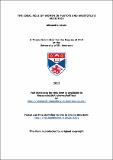Files in this item
The ideal role of women in Plato's and Aristotle's societies
Item metadata
| dc.contributor.advisor | Broadie, Sarah | |
| dc.contributor.author | Jawin, Alixandra | |
| dc.coverage.spatial | 150 | en_US |
| dc.date.accessioned | 2012-10-19T13:17:15Z | |
| dc.date.available | 2012-10-19T13:17:15Z | |
| dc.date.issued | 2012-06-19 | |
| dc.identifier.uri | https://hdl.handle.net/10023/3201 | |
| dc.description.abstract | This dissertation analyzes Plato’s and Aristotle’s conception of women’s proper role in the state. The first chapter demonstrates that due to Plato’s belief that the soul is sexless it is impossible to determine one’s role in society by one’s sex. Plato’s claim in the Republic that women who are qualified by nature will become guardians is therefore consistent with his larger view that one’s role in society should only be based on one’s nature. Since the only distinction between male and female Guardians is that women give birth to children and are physically weaker than men, there is no justification for barring women from the Guardian class. The second chapter turns to the Symposium and Plato’s thoughts on intellectual as well as physical pregnancy, and specifically that according to Plato the process of giving birth does not affect a woman’s soul or capacity to reason. In the third chapter I demonstrate that even outside the ideal city of the Republic, Plato does not revise his position on women’s capacities. The Laws is more concerned with practicality than the Republic and Plato is therefore forced to make concessions which limit women’s opportunity to govern, but such concessions are minor. This chapter also emphasizes Plato’s belief that good laws make good people and describes how this realization enables him to recognize that the poor condition of the women in Classical Athens is due to Athenian social institutions and not to women’s inferior nature. Finally, the fourth chapter turns to Aristotle and seeks to prove that his position on women’s role in the state is far more nuanced than appreciated. | en_US |
| dc.language.iso | en | en_US |
| dc.publisher | University of St Andrews | |
| dc.subject.lcc | B398.W55J2 | |
| dc.subject.lcsh | Sex role--Philosophy | en_US |
| dc.subject.lcsh | Women--Greece | en_US |
| dc.subject.lcsh | Plato--Political and social views | en_US |
| dc.subject.lcsh | Plato. Republic--Criticism and interpretation | en_US |
| dc.subject.lcsh | Plato. Laws--Criticism and interpretation | en_US |
| dc.subject.lcsh | Aristotle--Political and social views | en_US |
| dc.subject.lcsh | Philosophy, Ancient | en_US |
| dc.title | The ideal role of women in Plato's and Aristotle's societies | en_US |
| dc.type | Thesis | en_US |
| dc.type.qualificationlevel | Doctoral | en_US |
| dc.type.qualificationname | MPhil Master of Philosophy | en_US |
| dc.publisher.institution | The University of St Andrews | en_US |
This item appears in the following Collection(s)
Items in the St Andrews Research Repository are protected by copyright, with all rights reserved, unless otherwise indicated.

